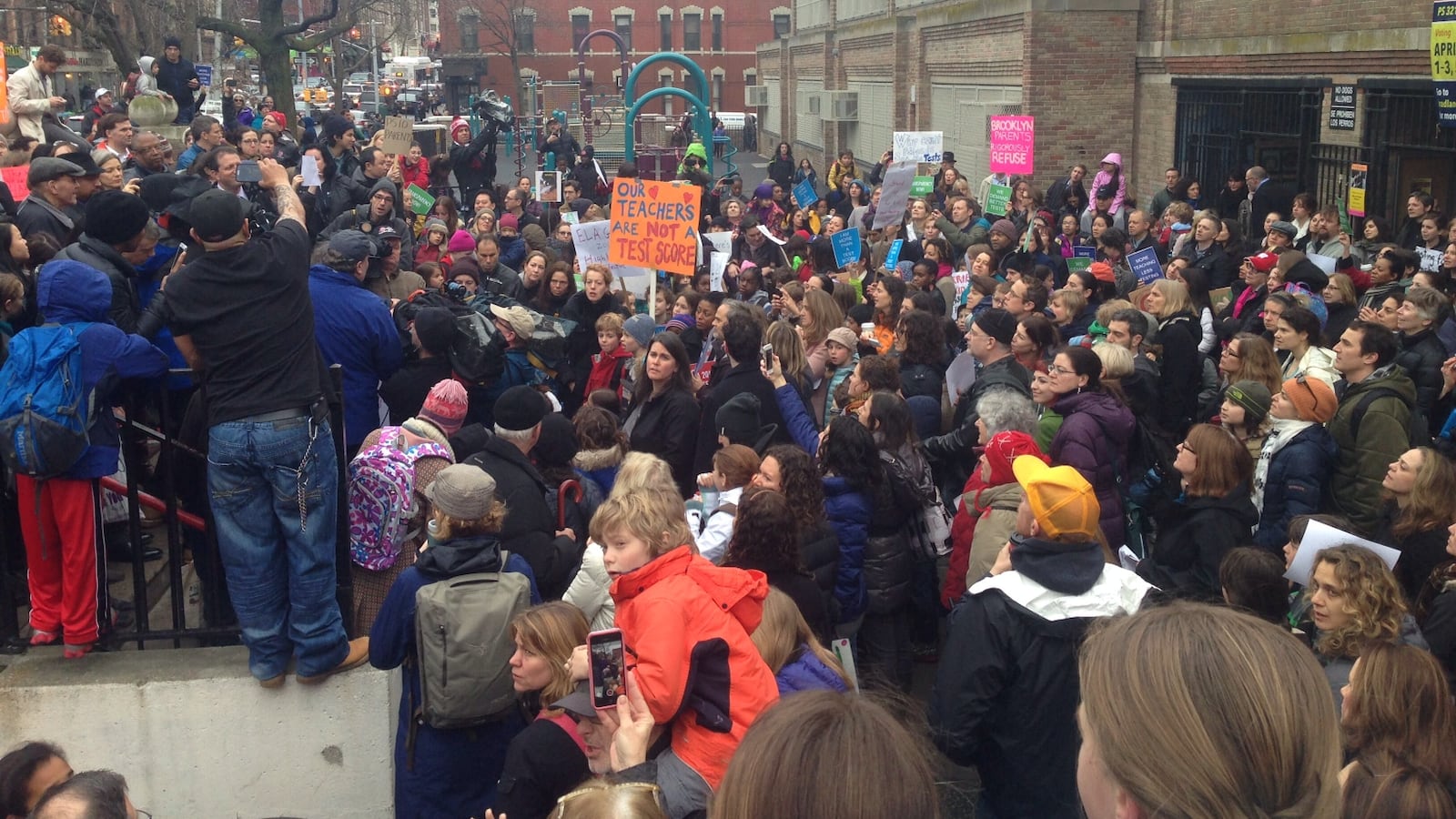With state tests just days away, New York City’s new chancellor waded into the state’s white hot opt-out debate — and some families were hoping for a different message.
Chancellor Richard Carranza said the choice to skip the test — which one in five New York state students did last year — was an “extreme reaction” during a lengthy interview on NY1.
Some parents involved in the state’s opt-out movement said that if pulling their children out of exams seemed rash, it is only because a dramatic protest was necessary to have their testing concerns heard. The parents said they hope to share these concerns with Carranza and that they intend to sit out the tests again this year.
“We tried many approaches to upset change in Albany,” said Tia Schellstede, who has a child at P.S. 10 in Brooklyn. But, she said, “Albany only listens to extreme reactions.”
The testing boycott movement has had some impact in New York. The protests were one factor that pushed state policymakers to change the state’s standardized tests, such as reducing the number of testing days in math and English each from three to two, and de-emphasize the use of tests in teacher evaluations and in judging schools.
“It’s up to parents to decide if their children should take the tests, and we want them to have the all the facts so they can make an informed decision,” said state education department spokeswoman Emily DeSantis.
It is unclear whether there will be less interest in the boycott this year. The numbers of families opting out, while still high, were down two percentage points last year. The debate is also different in New York City than in the rest of the state. Last year, only 3 percent of students in the city opted out of English exams and 3.5 percent opted out of math.
During Carranza’s interview, in addition to explaining the benefits of testing, he also acknowledged the limitations. “I think we need to educate the entire child and the entire child being educated is more than the sum total of a test,” Carranza said.
New York City education department officials stressed the same points as Carranza, saying that while test scores are only a snapshot of student performance, they provide important feedback to educators.
“Students are more than a single test score,” said education department spokeswoman Toya Holness. “State tests are one valuable tool for schools and educators to know how they’re doing and how they can improve instruction.”
Still, inside the opt-out movement, parents say they will continue refusing the test until more of their demands are met. They are pushing for significantly shorter tests, an end to the use of test scores as a factor in school closings, and test questions that are more appropriate for each grade level, said Megan Devir, who has children at P.S. 321 and MS 839 in Brooklyn.
“We found a tool (opting out) that’s effective and so why would we put this tool down now?” Devir said.
The traditional testing battle lines are being drawn already with state testing starting next week. Council member Daniel Dromm, the former head of the council’s education committee, is holding a press conference ahead of the tests calling on the education department to inform parents about their ability to opt out of tests.
He expressed his disappointment at Carranza’s statements in a phone call with Chalkbeat on Thursday. “I think that the only thing that’s extreme is the way the state misused these tests,” Dromm said. “I can totally understand why parents opt out of these tests.”
Meanwhile, Stephen Sigmund, executive director of High Achievement New York, an organization that backs taking the tests, has been traveling the state on a campaign to encourage test participation. Sigmund, who answered his phone on the way back from one such trip in Rochester, said he was encouraged by Carranza’s statements.
“We’re grateful that he is recognizing, as did Chancellor Fariña, the importance of taking state assessments,” Sigmund said. “They are an important part of figuring out what students need.”
Some parents said they still believe Carranza is not a supporter of high-stakes testing and wondered aloud if the chancellor’s comments were driven by a desire to align himself with the mayor, who they say has not embraced the opt-out movement.
“I’m not going to say Carranza’s disappointing,” said Kemala Karmen, who has been active in the testing refusal movement in New York City and has two children at the Institute for Collaborative Education. “I’m going to say the mayor is disappointing.”
Some of the opt-out parents were willing to cut the new chancellor a little slack. Ted Pauly, who has two sons at P.S. 321, said in an email response to Chalkbeat that he found Carranza likeable and that he appreciated that the new chancellor discussed the limitations of standardized testing. But he said that the testing refusal movement became necessary to push for changes when policymakers were not listening.
Others said the comment was likely to engender pushback.
“This is an infuriating statement that will be met with immense resistance and hostility,” said Michael Elliot, a parent of twins who attend MS 839 in Kensington emailed Chalkbeat a statement. “He just lit the fire in opt out.”

